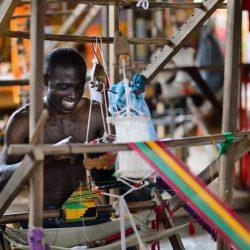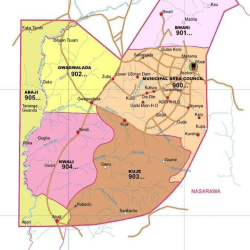The Abuja Arts and Crafts Village stands as a beacon of Nigeria’s rich cultural and artistic heritage. Tucked away in the heart of Abuja, this vibrant hub offers a glimpse into the diverse and ancient traditions of Nigerian artistry. It showcases a plethora of handcrafted items, ranging from intricate sculptures and textiles to the famed African masks that hold deep cultural and spiritual significance. For visitors, it is not only a market but an immersive cultural experience, allowing them to explore the legacy of one of Africa’s most celebrated artistic traditions.
The village is a living testament to Nigeria’s artistic heritage, where visitors can explore and appreciate the country’s diverse and rich cultural expressions. From the exquisite wooden sculptures to the spiritually significant African masks, the village provides a meaningful and enriching experience. It celebrates the skill of Nigerian artisans while connecting visitors to the deep cultural and historical roots of the art they create.
Whether you’re in search of unique handicrafts, looking to learn about Nigeria’s cultural history, or simply want to enjoy a peaceful retreat in a beautiful setting, the Abuja Arts and Crafts Village is a destination that should not be missed.
The Significance of Traditional Nigerian Art
Nigeria’s cultural history is deeply rooted in its artistic expressions, and the Abuja Arts and Crafts Village captures this essence beautifully. The village showcases various forms of art, including:
- Sculpture: Expertly crafted wooden and metal sculptures are central to Nigerian art, often representing deities, historical figures, or animals.
- Pottery and Textiles: Beautifully designed pottery and richly patterned textiles are staples of Nigerian craftsmanship. These items reflect the skills passed down through generations and the deep connection between art and daily life in Nigeria.
- Masks: One of the most iconic elements of Nigerian and broader African art, masks hold a special place in the cultural identity of many tribes. They are used in traditional ceremonies and rituals, each mask carrying a unique symbolic meaning tied to the tribe or region from which it originates.
Exploring the Village
Walking into the Abuja Arts and Crafts Village feels like stepping into a cultural oasis. Picturesque thatched huts with red-brick walls line the village, each housing an array of art and handicrafts. Visitors are drawn in by the vibrant displays of:
- Wooden animal statues: Intricate carvings that symbolize the deep respect for wildlife in Nigerian culture.
- Jewelry and trinkets: From beaded necklaces to beautifully designed bangles, visitors can find a wide variety of jewelry reflecting traditional Nigerian craftsmanship.
- Textiles and embroidery: The vibrant colors and detailed patterns of Nigerian fabrics, including handwoven pieces, tell stories of the regions and cultures they come from.
African Masks: Symbolism and Universal Appeal
At the core of the village’s appeal are the traditional African masks. These masks are more than just artistic creations; they carry rich spiritual and ceremonial meaning. In many Nigerian cultures, particularly among the Yoruba, Edo, and Igbo peoples, masks are used in dances, rituals, and social ceremonies. Each mask represents a different spirit, deity, or ancestor, making them vital cultural symbols. The village offers a unique opportunity to learn about the various regional masks and their significance.



African masks have also had a profound influence on global art movements. During the 20th century, masks from Africa played a pivotal role in inspiring European avant-garde artists such as Pablo Picasso and Henri Matisse. The bold, abstract forms and emotional depth of African masks helped fuel movements like Cubism, Fauvism, and Expressionism, revolutionizing the world of modern art.
Wole Soyinka and the Theatrical Connection
Wole Soyinka, Nigeria’s Nobel Prize-winning writer, often explored the connection between traditional African masks and the world’s theatrical traditions. He drew fascinating parallels between the use of masks in Nigerian rituals, particularly those of the Yoruba and Edo peoples, and the theater of ancient Greece. Soyinka argued that the symbolism and communal function of African masks in ceremonies echoed the role of masks in classical Western theater, highlighting the universal human need for storytelling, performance, and connection to the spiritual realm.
The Artists and Their Expertise
One of the most rewarding aspects of visiting the Abuja Arts and Crafts Village is the opportunity to engage with the artists and craftspeople who create and sell their work. These individuals are not only skilled artisans but also cultural historians. They readily share their knowledge, explaining the origins of the items they sell, the stories behind their designs, and the cultural significance of their art. This personal connection adds a deeper dimension to the shopping experience, making each piece not just a souvenir but a window into Nigeria’s rich cultural history.
A Must-Visit Destination in Abuja
For anyone visiting Abuja, the Arts and Crafts Village is a “must-see” destination. Beyond its aesthetic appeal, the village serves as a cultural hub, offering visitors an intimate understanding of Nigeria’s artistic legacy. Whether you’re an art connoisseur or simply looking for a unique experience, the village offers something for everyone. It is a place where ancient traditions meet modern appreciation, and where the beauty of Nigerian craftsmanship is on full display.



















